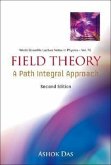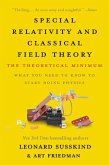- Broschiertes Buch
- Merkliste
- Auf die Merkliste
- Bewerten Bewerten
- Teilen
- Produkt teilen
- Produkterinnerung
- Produkterinnerung
Quantum Field Theory has become the universal language of most modern theoretical physics. This introductory textbook shows how this beautiful theory offers the correct mathematical framework to describe and understand the fundamental interactions of elementary particles.
Andere Kunden interessierten sich auch für
![Classical and Quantum Dissipative Systems Classical and Quantum Dissipative Systems]() Mohsen RazavyClassical and Quantum Dissipative Systems94,99 €
Mohsen RazavyClassical and Quantum Dissipative Systems94,99 €![SPACES AND DIMENSIONS OF QUANTUM FIELDS SPACES AND DIMENSIONS OF QUANTUM FIELDS]() George TsouprosSPACES AND DIMENSIONS OF QUANTUM FIELDS91,99 €
George TsouprosSPACES AND DIMENSIONS OF QUANTUM FIELDS91,99 €![Field Theory: A Path Integral Approach (2nd Edition) Field Theory: A Path Integral Approach (2nd Edition)]() Ashok DasField Theory: A Path Integral Approach (2nd Edition)77,99 €
Ashok DasField Theory: A Path Integral Approach (2nd Edition)77,99 €![Six Impossible Things Six Impossible Things]() John GribbinSix Impossible Things14,99 €
John GribbinSix Impossible Things14,99 €![Reality Is Not What It Seems Reality Is Not What It Seems]() Carlo RovelliReality Is Not What It Seems14,99 €
Carlo RovelliReality Is Not What It Seems14,99 €![Special Relativity and Classical Field Theory Special Relativity and Classical Field Theory]() Leonard SusskindSpecial Relativity and Classical Field Theory17,99 €
Leonard SusskindSpecial Relativity and Classical Field Theory17,99 €![Introduction to Quantum Mechanics: Schrodinger Equation and Path Integral (Second Edition) Introduction to Quantum Mechanics: Schrodinger Equation and Path Integral (Second Edition)]() Harald J W Muller-KirstenIntroduction to Quantum Mechanics: Schrodinger Equation and Path Integral (Second Edition)82,99 €
Harald J W Muller-KirstenIntroduction to Quantum Mechanics: Schrodinger Equation and Path Integral (Second Edition)82,99 €-
-
-
Quantum Field Theory has become the universal language of most modern theoretical physics. This introductory textbook shows how this beautiful theory offers the correct mathematical framework to describe and understand the fundamental interactions of elementary particles.
Produktdetails
- Produktdetails
- Verlag: Oxford University Press
- Seitenzahl: 950
- Erscheinungstermin: 26. März 2017
- Englisch
- Abmessung: 251mm x 103mm x 66mm
- Gewicht: 1758g
- ISBN-13: 9780198788409
- ISBN-10: 0198788401
- Artikelnr.: 47544742
- Herstellerkennzeichnung
- Libri GmbH
- Europaallee 1
- 36244 Bad Hersfeld
- gpsr@libri.de
- Verlag: Oxford University Press
- Seitenzahl: 950
- Erscheinungstermin: 26. März 2017
- Englisch
- Abmessung: 251mm x 103mm x 66mm
- Gewicht: 1758g
- ISBN-13: 9780198788409
- ISBN-10: 0198788401
- Artikelnr.: 47544742
- Herstellerkennzeichnung
- Libri GmbH
- Europaallee 1
- 36244 Bad Hersfeld
- gpsr@libri.de
Laurent Baulieu is currently CNRS Research Director at the University of Paris, where he has long been the head of the Theoretical Physics Department. His main field of research is Quantum Field Theory, the Theory of Elementary Particles and Symmetries. He has been an organizer of many summer schools and workshops on various aspects of Quantum Field Theory, especially in les Houches and in the Cargèse Institute in Corsica. John Iliopoulos is Director of Research Emeritus at the Ecole Normale Supérieure in Paris, where for many years he was the head of the Theoretical Physics Department. His research was centred around theoretical particle physics. In 1970, in collaboration with Sheldon Glashow and Luciano Maiani, he predicted the existence of the charm quark and proposed the GIM mechanism, an important step in the construction of the Standard Model. He has also contributed to the development of supersymmetry (with Bruno Zumino and Pierre Fayet). He has received many awards, such as the Ricard Prize of the French Physical Society, the Sakurai Prize of the American Physical Society, the High Energy Physics Prize of the European Physical Society and the Dirac Medal. Roland Sénéor is Director of Research Emeritus at the French CNRS. He spent most of his career at the Ecole Polytechnique, where he established and directed the Graduate School and was the Head of the Department for International Scientific Relations. His research centered on the mathematical foundations of QFT: the axiomatic formulation, the constructive approach, the summability of the perturbation expansion and the study of dynamic stochastic models. He has received various awards, including the Langevin Prize of the French Physical Society.
1: Introduction
2: Relativistic Invariance
3: The Electromagnetic Field
4: General relativity: A Field Theory of Gravitation
5: The Physical States
6: Relativistic Wave Equations
7: Towards a Relativistic Quantum Mechanics
8: Functional Integrals and Probabilistic Amplitudes
9: Functional Integrals and Quantum Mechanics: Formal Developments
10: The Euclidean Functional Integrals
11: Fermions and Functional Formalism
12: Relativistic Quantum Fields
13: Applications
14: Geometry and Quantum Dynamics
15: Broken Symmetries
16: Quantum Field Theory at Higher Orders
17: A First Glance at Renormalisation and Symmetry
18: Renormalisation of Yang-Mills Theory and BRST Symmetry
19: Some Consequences of the Renormalisation Group
20: Analyticity Properties of Feynman Diagrams
21: Infrared Singularities
22: Coherent States and Classical Limit of Quantum Electrodynamics
23: Quantum Field Theories with a Large Number of Fields
24: The Existence of Field Theories beyond the Perturbation Expansion
25: Fundamental Interactions
26: Beyond the Standard Model
27: Supersymmetry, or the Defense of Scalars
Appendix A: Tensor Calculus
Appendix B: Differential Calculus
Appendix C: Groups and Lie Algebras
Appendix D: A collection of Useful Formulae
Appendix E: Extract from Maxwell's A Treatise on Electricity and Magnetism
2: Relativistic Invariance
3: The Electromagnetic Field
4: General relativity: A Field Theory of Gravitation
5: The Physical States
6: Relativistic Wave Equations
7: Towards a Relativistic Quantum Mechanics
8: Functional Integrals and Probabilistic Amplitudes
9: Functional Integrals and Quantum Mechanics: Formal Developments
10: The Euclidean Functional Integrals
11: Fermions and Functional Formalism
12: Relativistic Quantum Fields
13: Applications
14: Geometry and Quantum Dynamics
15: Broken Symmetries
16: Quantum Field Theory at Higher Orders
17: A First Glance at Renormalisation and Symmetry
18: Renormalisation of Yang-Mills Theory and BRST Symmetry
19: Some Consequences of the Renormalisation Group
20: Analyticity Properties of Feynman Diagrams
21: Infrared Singularities
22: Coherent States and Classical Limit of Quantum Electrodynamics
23: Quantum Field Theories with a Large Number of Fields
24: The Existence of Field Theories beyond the Perturbation Expansion
25: Fundamental Interactions
26: Beyond the Standard Model
27: Supersymmetry, or the Defense of Scalars
Appendix A: Tensor Calculus
Appendix B: Differential Calculus
Appendix C: Groups and Lie Algebras
Appendix D: A collection of Useful Formulae
Appendix E: Extract from Maxwell's A Treatise on Electricity and Magnetism
1: Introduction
2: Relativistic Invariance
3: The Electromagnetic Field
4: General relativity: A Field Theory of Gravitation
5: The Physical States
6: Relativistic Wave Equations
7: Towards a Relativistic Quantum Mechanics
8: Functional Integrals and Probabilistic Amplitudes
9: Functional Integrals and Quantum Mechanics: Formal Developments
10: The Euclidean Functional Integrals
11: Fermions and Functional Formalism
12: Relativistic Quantum Fields
13: Applications
14: Geometry and Quantum Dynamics
15: Broken Symmetries
16: Quantum Field Theory at Higher Orders
17: A First Glance at Renormalisation and Symmetry
18: Renormalisation of Yang-Mills Theory and BRST Symmetry
19: Some Consequences of the Renormalisation Group
20: Analyticity Properties of Feynman Diagrams
21: Infrared Singularities
22: Coherent States and Classical Limit of Quantum Electrodynamics
23: Quantum Field Theories with a Large Number of Fields
24: The Existence of Field Theories beyond the Perturbation Expansion
25: Fundamental Interactions
26: Beyond the Standard Model
27: Supersymmetry, or the Defense of Scalars
Appendix A: Tensor Calculus
Appendix B: Differential Calculus
Appendix C: Groups and Lie Algebras
Appendix D: A collection of Useful Formulae
Appendix E: Extract from Maxwell's A Treatise on Electricity and Magnetism
2: Relativistic Invariance
3: The Electromagnetic Field
4: General relativity: A Field Theory of Gravitation
5: The Physical States
6: Relativistic Wave Equations
7: Towards a Relativistic Quantum Mechanics
8: Functional Integrals and Probabilistic Amplitudes
9: Functional Integrals and Quantum Mechanics: Formal Developments
10: The Euclidean Functional Integrals
11: Fermions and Functional Formalism
12: Relativistic Quantum Fields
13: Applications
14: Geometry and Quantum Dynamics
15: Broken Symmetries
16: Quantum Field Theory at Higher Orders
17: A First Glance at Renormalisation and Symmetry
18: Renormalisation of Yang-Mills Theory and BRST Symmetry
19: Some Consequences of the Renormalisation Group
20: Analyticity Properties of Feynman Diagrams
21: Infrared Singularities
22: Coherent States and Classical Limit of Quantum Electrodynamics
23: Quantum Field Theories with a Large Number of Fields
24: The Existence of Field Theories beyond the Perturbation Expansion
25: Fundamental Interactions
26: Beyond the Standard Model
27: Supersymmetry, or the Defense of Scalars
Appendix A: Tensor Calculus
Appendix B: Differential Calculus
Appendix C: Groups and Lie Algebras
Appendix D: A collection of Useful Formulae
Appendix E: Extract from Maxwell's A Treatise on Electricity and Magnetism








